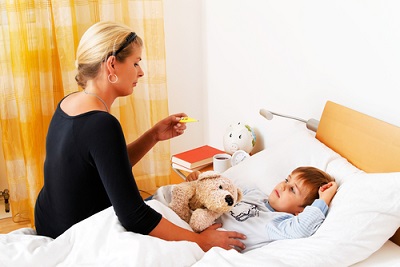 Below is a list of signs and symptoms which studies have shown to be indicators of when urgent advice is required. It is important to stress that no list is exhaustive and that there is no substitute for a mother’s intuition.
Below is a list of signs and symptoms which studies have shown to be indicators of when urgent advice is required. It is important to stress that no list is exhaustive and that there is no substitute for a mother’s intuition.If your child shows more than one of the following signs, seek urgent medical attention:
- A fever that lasts more than 48 hours or a fever that reaches 39.5 C or higher at any time. If your baby is less than six months and has a temperature of over 38 degrees, you should always seek help.
- Ear pain - this may indicate an ear infection, and treatment may prevent ear drum rupture.
- Difficulty breathing or sudden wheezing - with each breath, you might notice the muscles between the ribs being sucked in, or your baby might be blue around the mouth.
- Drowsiness - your baby is less alert than usual; she makes less eye contact, and is generally less aware of sounds and movement and of the immediate environment. The more drowsy the baby, the greater the chance of serious illness.
- A seizure - febrile convulsions sometimes happen when very young children have a high temperature, but it’s always best to see a doctor, to be completely sure of the reason for the fever.
- Severe vomiting and/or diarrhoea that continue for longer than 24 hours, as it could possibly lead to dehydration.
- Rashes that appear suddenly and spread quickly, and occur in tandem with any of the things listed above.
- The presence of blood, such as coughing up blood or blood in your child’s urine or vomit. Green vomit always requires urgent assessment in a baby.
- Decreased activity - your baby is less active and moves his arms and legs less. He might just tend to lie around, or want to be cuddled by a parent, rather than be involved in activities that he usually likes.
- Poor circulation - your baby might look paler than usual, and this can last for up to several hours. Your baby’s hands and feet might be cold or even blue.
- Poor feeding - your baby drinks much less than usual. Breastfed babies will suck less strongly and for shorter periods of time. Bottle-fed babies take less than half the normal amount of milk that they normally drink in 24 hours. The baby might not be very interested in feeding in general.
- Poor urine output - the baby has fewer than four wet nappies in 24 hours.

The doctor’s job isn’t just to diagnose and treat illness; doctors are also there to reassure you that your child is well. Seeing the doctor can make you feel a lot less anxious.
You might not want to worry the doctor with what might turn out to be a trivial illness, especially at night, or if you think that the doctor is very busy. You might be anxious that your fears are groundless and that you will look foolish if your baby turns out to have a minor illness. Many doctors have children and babies of their own, have been to Accident and Emergency in the middle of the night, and are happy if it turns out to be a false alarm. No doctor wants to have a terribly sick baby in their care.
Most general practitioners will always find time to see a child if the parents are worried. Most GP clinics allow for emergency appointments throughout the day. Make sure you have phone numbers for the clinic’s after-hours services- such as doctor on duty or local out of hour doctors’ co-ops.
A good motto is “If in doubt, find out”.








